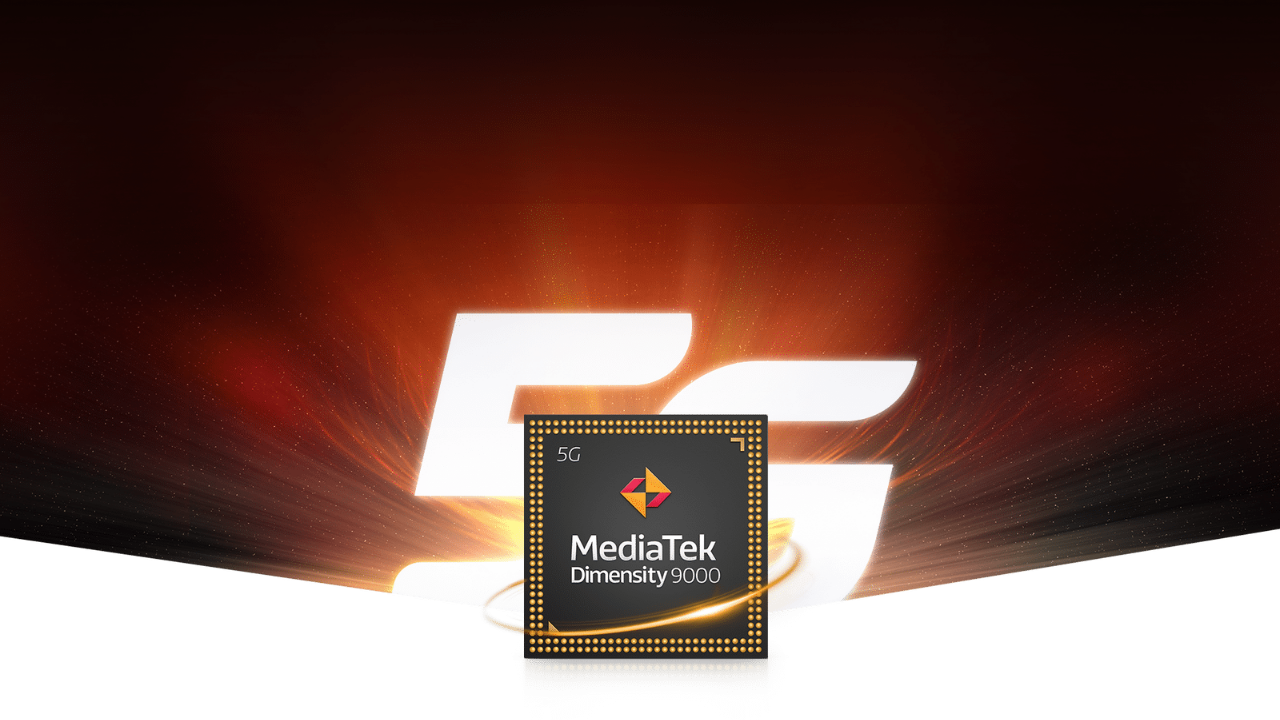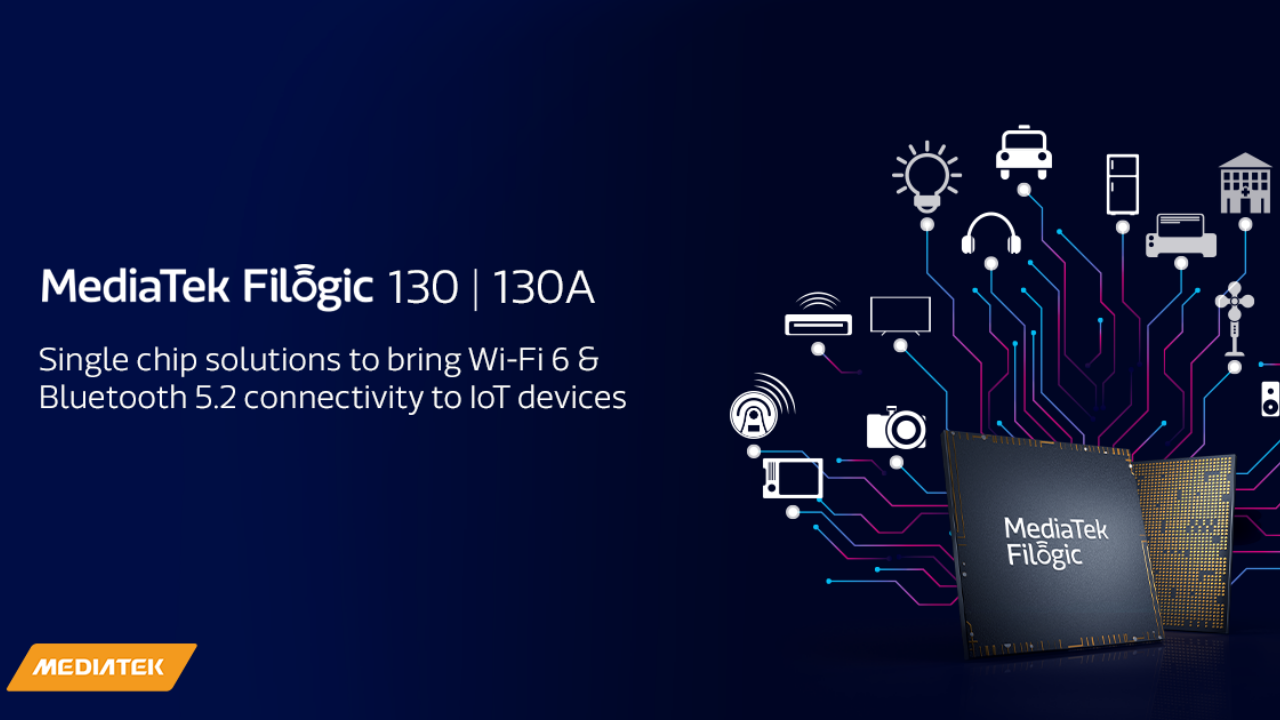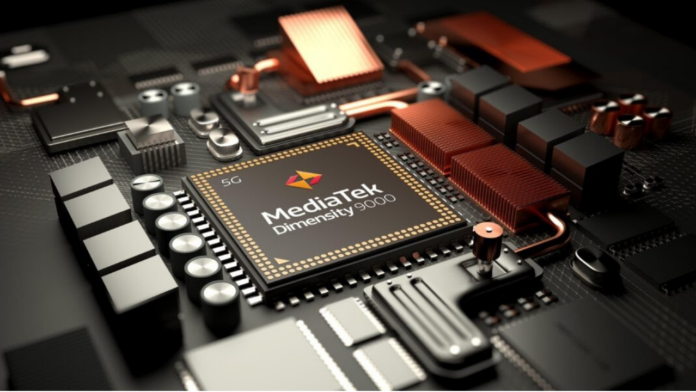MediaTek has unveiled its flagship processor that will be employed in flagship smartphones of 2022. The processor is called the MediaTek Dimensity 9000 and should be competing with Snapdragon’s upcoming high-end chip for smartphones. In addition, MediaTek also unveiled new Filogic 130, Filogic 130A single-chip solutions for IoT devices.
MediaTek Dimensity 9000

The MediaTek Dimensity 9000 is made using TSMC N4 (4nm-class) production. The chip is the first to use ARM’s new v9 architecture and has a single Cortex-X2 performance core clocked at 3.05GHz, three Cortex-A710 cores at 2.85GHz, and four Cortex-A510 efficiency cores at 1.8GHz.
For graphics, the Chipset sports a 10-core Arm Mali-G710. It is the world’s 1st Arm Mali-G710 MC10 graphics processor with industry’s 1st raytracing SDK using Vulkan for Android. The Dimensity 9000 supports LPDDR5x memory at bandwidths of up to 7,500 Mbps. Moreover, there’s MediaTek’s fifth-generation APU with a total of six cores handling AI processing. It is claimed to offer four times the performance and power efficiency compared to its previous generation.
A flagship 18-bit HDR-ISP design gives users the first opportunity to capture HDR video on three cameras simultaneously. Capture an event using all different cameras (for example: wide, standard and zoom) for later editing. There’s 9Gpixel/s ISP along with world’s 1st simultaneous triple camera 18-bit HDR video recording (three cameras recording with three exposures per frame) and world’s 1st 320MP camera support for smartphones.
The chip can support up to 180Hz FullHD+ displays. The Dimensity 9000 integrates the only 5G smartphone Modem with 3GPP Release-16 standard technology into the chip. There’s 3CC Carrier Aggregation (300MHz) with 7Gbps downlink. Furthermore, the chip also employs MediaTek 5G UltraSave 2.0, a new generation power saving enhancement suite.
As for wireless connectivity, there’s up to Bluetooth 5.3 support, Wi-Fi 6E 2×2 (BW160) with up to 2X better performance efficiency than previous generation and support for the latest 6GHz connectivity. The chip also integrates Bluetooth LE Audio-ready technology with Dual-Link True Wireless Stereo Audio and New Beidou III-B1C GNSS support.
First set of devices to debut with this processor are expected to launch some time in the first quarter of 2022. There’s no confirmation as to what companies will first be launching smartphones with this chip.
Read More: Qualcomm Snapdragon 898 to debut on November 30 at Tech Summit 2021?
MediaTek Filogic 130, Filogic 130A

MediaTek Filogic 130 and Filogic 130A system-on-chips (SoCs) both integrate a microprocessor (MCU), AI engine, Wi-Fi 6 and Bluetooth 5.2 subsystems, and a power management unit (PMU) into a single chip.
Filogic 130 and Filogic 130A both support 1T1R Wi-Fi 6 connectivity and Dual-Band 2.4GHz and 5GHz, along with advanced Wi-Fi features such as target wake time (TWT), MU-MIMO, MU-OFDMA, quality of service (QoS) and WPA3 Wi-Fi security. To ensure that users’ Wi-Fi connectivity remains reliable even when Bluetooth devices are in use at the same time, the solutions support advanced Wi-Fi and Bluetooth coexistence.
Both single-chip solutions integrate an Arm Cortex-M33 microcontroller which is supported by embedded RAM and external flash and an integrated front-end module (iFEM) that supports low noise amplifier (LNA) and power amplifier (PA) functionality. The Filogic 130A also integrates an integrated HiFi4 DSP for more accurate far-field voice processing, always-on microphone capability with voice activity detection and trigger word support.
The SoCs also allow devices to achieve Energy Star and Green Appliance ratings and certifications. The solutions also support secure boot and hardware crypto engines for robust security capabilities and support a variety of interfaces including general purpose iOS such as SPI, I2C, I2S, IR input, UART, AUXADC, PWM and GPIO interfaces to make the design process easier.


